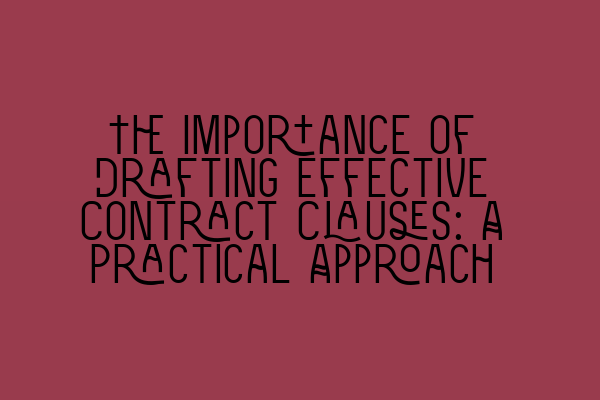The Importance of Drafting Effective Contract Clauses: A Practical Approach
Contracts are the backbone of any business transaction. They provide a legally binding framework that outlines the rights, obligations, and expectations of all parties involved. However, not all contracts are created equal. The effectiveness of a contract often hinges on the quality of its clauses.
In this blog post, we will explore the importance of drafting effective contract clauses and provide a practical approach to ensure your contracts are robust, clear, and enforceable. Whether you are a solicitor, business owner, or individual entering into a contract, understanding the significance of well-drafted clauses is crucial.
1. Clarity and Understanding
One of the primary purposes of a contract is to clearly define the rights and obligations of each party. Ambiguous or poorly drafted clauses can lead to confusion, disagreements, and potential litigation. By using clear and precise language in your contract clauses, you can minimize the chances of misinterpretation and ensure that both parties understand their rights and responsibilities.
For example, when drafting an employment contract, a well-drafted clause clearly outlining the job description, responsibilities, and performance standards can help avoid misunderstandings between the employer and the employee. Clarity is key.
2. Mitigating Disputes
Disputes are an inevitable part of any contractual relationship. However, well-drafted contract clauses can help mitigate the risk of conflicts and provide mechanisms for resolution.
For instance, including a dispute resolution clause that outlines specific steps, such as negotiation, mediation, or arbitration, can streamline the process in case of a dispute. This not only saves time and costs but also allows parties to resolve their issues in a more amicable and efficient manner.
3. Allocating Risk and Liability
Effective contract clauses also allocate risk and liability between the parties involved. By clearly defining the scope of responsibility for each party, you can protect your interests and minimize potential losses.
Insurance clauses are commonly used to allocate risk and determine who should bear the costs in case of any unforeseen events or accidents. A well-drafted insurance clause can outline the types of insurance coverage required, the minimum coverage limits, and the process for filing claims. This helps ensure that all parties are adequately protected and aware of their obligations concerning insurance matters.
4. Compliance with Legal Requirements
The legal landscape is constantly evolving, and it is essential for contracts to adapt to these changes. Drafting effective contract clauses involves staying updated with relevant laws and regulations and incorporating them into your agreements.
For example, if you are entering into a lease agreement, it is imperative to include clauses that comply with local tenancy laws, such as those relating to security deposits, rent increases, and termination notice periods. By doing so, you not only protect yourself from legal liabilities but also demonstrate a commitment to maintaining legal compliance.
5. Flexibility and Adaptability
Contracts should be flexible and adaptable to accommodate unforeseen circumstances and changes in business or personal relationships. Well-drafted clauses include provisions that address potential scenarios or provide mechanisms for renegotiation and amendment.
For instance, a force majeure clause allows parties to suspend or terminate the contract in the event of unforeseen circumstances beyond their control, such as natural disasters or acts of war. By including such a clause, you can protect yourself from being held liable for non-performance in such exceptional circumstances.
Conclusion
Drafting effective contract clauses is an essential skill for solicitors, business owners, and individuals entering into agreements. By ensuring clarity, mitigating disputes, allocating risk, complying with legal requirements, and allowing for flexibility, you can create contracts that protect your interests and facilitate smooth business transactions.
Remember, the language and structure of your contract clauses matter. Investing time and effort in drafting well-crafted clauses can prevent costly disputes, protect your rights, and promote successful and collaborative relationships.
To further enhance your understanding of contract law and prepare for the SQE exams, you might find the following articles helpful:
– SQE 1 Practice Exam Questions
– SQE 1 Practice Mocks FLK1 FLK2
– SQE 2 Preparation Courses
– SQE 1 Preparation Courses
– SRA SQE Exam Dates
These resources will provide you with additional knowledge and insights into contract law, helping you excel in your legal career or educational pursuits.
Remember, effective contract drafting is an art. With practice and a focus on clarity, understanding, and legal compliance, you can become a skilled solicitor capable of drafting compelling and enforceable contracts.
